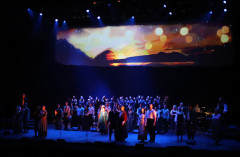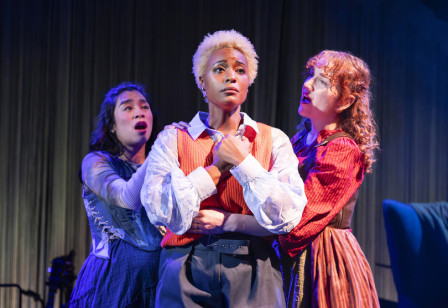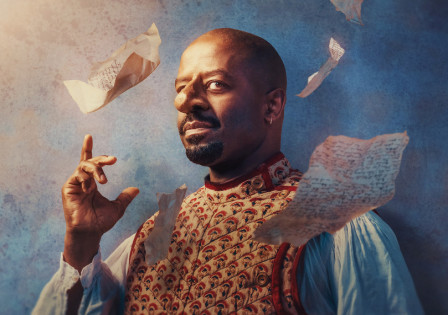Review: THE PIRATE QUEEN at The London Coliseum
 The original 2007 Broadway run of The Pirate Queen (created by the Les Miserables team), made an estimated loss in excess of $16 million due to high running costs and mediocre box office interest. But did producer Tom Gribby’s much anticipated, one-night, semi-staged version at the Coliseum, signal a possible future London opening?
The original 2007 Broadway run of The Pirate Queen (created by the Les Miserables team), made an estimated loss in excess of $16 million due to high running costs and mediocre box office interest. But did producer Tom Gribby’s much anticipated, one-night, semi-staged version at the Coliseum, signal a possible future London opening?
The Broadway production’s 32 preview performances resulted in a fairly lukewarm critical response and were followed by a further 85 performances played to gradually diminishinghouses. Sunday even
With an eleven piece orchestra (including Uilleann pipes for that authentic Gaelic feel), and a supplementing choir drawn from Mountview and ArtsEd drama schools — all under the clinically meticulous baton of Julian Kelly — Schönberg’s score certainly offers plenty of drama and passion, but there is perhaps a tendency to overplay the intensity where a little more light and shade would lend subtlety and give the lead singers respite from their seemingly endless high-octane vocal exertions.
Despite a few technical mic issues early in the performance, Rachel Tucker as Pirate Queen, Grace O’Malley gave an assured performance with just enough swagger to remain on the right side of likeable tomboy. The counterpoint character is a detached and austere Elizabeth I of England played by Hannah Waddingham whose semi-operatic delivery paired regal aloofness with comedic superiority in equal measure. Their women’s duet She Who Has All was especially effective. Of the men, Jai McDowell (winner of the 5th season of TV’s Britain’s Got Talent) shone brightly as Grace’s love interest Tiernan, especially in their duet If I Said I Loved You and in his impassioned, roof-raiser I’ll Be There, where his beautiful phrasing and tone would have served the show better as the natural closer to the first half.
There are obvious stylistic overlaps and comparisons to be made with Les Mis, but not everything fitted seamlessly. Boys Will Be Boys attempted to imbue a moment of rumbustious levity, yet felt like an out-take from Oliver, and Rah-Rah Tip-Top flopped as an exercise in clipped courtier sycophancy.
All-in-all however, it was a bold effort which will doubtless continue to feed talk of a full-scale London staging.
Latest News

 Full cast announced for David Hare's TEETH 'N' SMILES at Duke of York's Theatre
30 January 2026 at 11:02
Full cast announced for David Hare's TEETH 'N' SMILES at Duke of York's Theatre
30 January 2026 at 11:02

 Review: BALLAD LINES at Southwark Playhouse (Elephant)
30 January 2026 at 10:52
Review: BALLAD LINES at Southwark Playhouse (Elephant)
30 January 2026 at 10:52

 BURLESQUE THE MUSICAL announces London return and major UK tour
30 January 2026 at 10:12
BURLESQUE THE MUSICAL announces London return and major UK tour
30 January 2026 at 10:12

 The RSC's critically acclaimed production of CYRANO DE BERGERAC to transfer to the West End
30 January 2026 at 10:00
The RSC's critically acclaimed production of CYRANO DE BERGERAC to transfer to the West End
30 January 2026 at 10:00